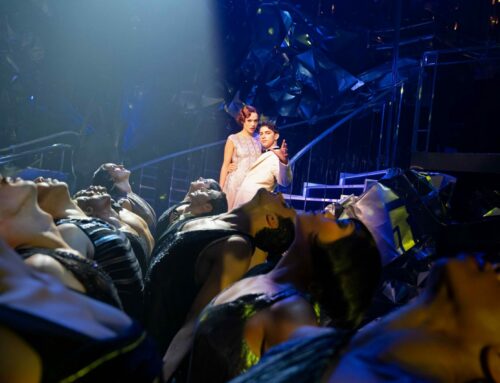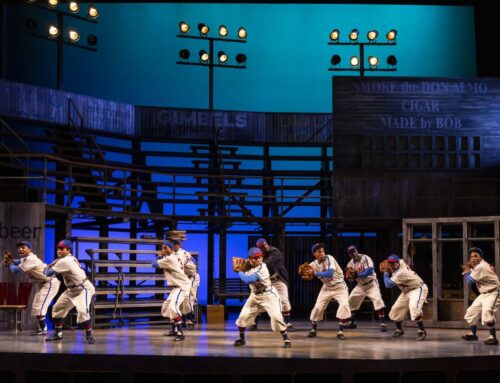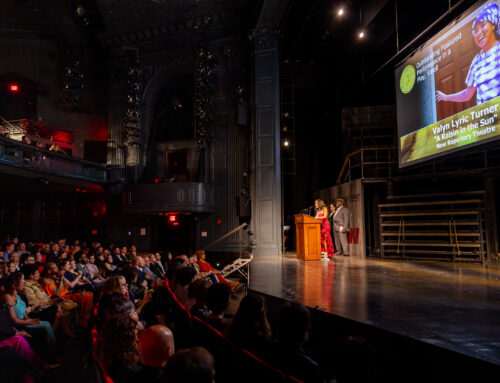Want some theater to digest this Thanksgiving weekend? Here’s my take on what you might like!
QUIXOTE NUEVO–This delightful new adaptation of Cervantes’ “Don Quixote” by Octavio Solis is an illuminating, funny, heartbreaking, and wholly relevant musical adventure, and the first time I have fully connected with this classic saga of a hero tilting at windmills. Our hero is an elderly latino gentleman and retired professor named Jose Quijano played by the elegant Emilio Delgado, best known as Sesame Street’s repairman “Luis.” There isn’t a windmill in sight, but there are battles between reality and fantasy, life and death, border patrol and fleeing migrants. Joe’s helmet is a bed pan, his horse is a giant three-wheeler, and his “Sancho Panza” is an ice cream vendor named Manny Diaz played by the uproarious Juan Manuel Amador.
“Joe” has dementia and escapes his imminent placement in a nursing home by setting out on the border between Texas and Mexico in La Plancha, trying to make peace with his demons as he looks back at life and a lost love. His misplaced chivalry extends to those fleeing for their lives across the border, down on their luck barmaids, and pretty much anyone who crosses his path. The script’s references are up to the minute: Snapchat and Game of Thrones, Mar a Lago and Spotify, while the spirit of the piece remains faithful to Cervantes. Everyone is eventually beguiled by the power and humanity of Joe’s vision, their grip on literal reality giving way to this “nuevo” Knight-errant’s warmth, idealistic soul, and imagination.
Director KJ Sanchez finesses this fluid landscape of tone and consciousness with an abundance of humor & heart, clever transitions and staging. Lighting and sets are magically real. Composer David R. Molina’s sound design is rooted in traditional Mexican and Border music, by turns lyrical, haunting, percussive, eery, conjuring up reality or fantasy as the journey requires. Sometimes I wished the jokes and the performances weren’t as forced; the ensemble, many in dual roles, waft between worlds as boundaries melt away, but ironically carry more weight in the world of fantasy: Gisela Chipe, a bit broad as Joe’s psychiatrist, for example, is a tender and believable Dulcinea. The last scene resolves all in one, gorgeous healing tableau on the edge of hope and heartbreak. Through December 8 presented by Huntington Theatre Company in association with Hartford Stage and Alley Theatre!
THE SEAGULL: I had mixed reactions to this new translation and adaptation of Chekhov’s classic at Arlekin Players Theatre which draws its repertoire from classic and contemporary Russian theater. Here they’ve have added a layer to THE SEAGULL about group of characters gathering on a country estate whose lack of insight about themselves and each other, and the self-limiting choices they make, lead to their unhappiness.
In THE SEAGULL, legendary actress Irina Arkadina (Anne Gottlieb) and the man she loves, famed author Boris Trigorin (Nael Nacer) are about to watch Irina’s son Konstantin’s (Eliott Purcell) new play starring the woman he loves, the beautiful Nina (Irina Bordian). What ensues is a roundelay of unrequited love, jealousy, dashed dreams, competing artistic visions, and death. Gottlieb and Nacer are instantly compelling, Gottlieb revealing Arkadina’s need beneath her vanity, Nacer balancing Trigorin’s sexual appetite with a rigid self-satisfaction. But Bordian overacts Nina’s writhing dissolution.
This re-imagined production is framed by the audience on two sides, and by an additional conceptual layer: at the very beginning, we watch the cast and their Chekhov look-alike director (artistic director Igor Golyak) choose the characters they will play in THE SEAGULL, several of whom are actors and playwrights. So the production begins, with a play about to begin, within a play, within a play that has just been cast. It’s a bit confusing and depends upon considerable familiarity with THE SEAGULL. Snippets of Chekhov’s letters are also interspersed throughout the action shedding light on the playwright’s intentions, the intellectual context of the era, and the action of the play.
This production also leaves out the comedy in Chekhov’s tragi-comedy. I once remember a production of “The Seagull” that had me laughing out loud at Masha’s very first line about being in mourning for her life! Nothing could be farther from the un-ironic tone set here. I was, however, mesmerized by scenic designer Nikolay Simonov’s set. It slid back and forth across the floor, almost like a camera lens pulling our focus; at the end of the first half, the set moved, which along with the lighting and layers of dark scrim curtains, evoked an effect akin to an “iris out” shot in a silent film where a black circle closes around the action to end the scene. Here two lovers kissed while dissolving into darkness. Stunning.
Check out this new adaptation of THE SEAGULL at ARLEKIN and tell me what you think. Through December 8!








Leave A Comment
You must be logged in to post a comment.